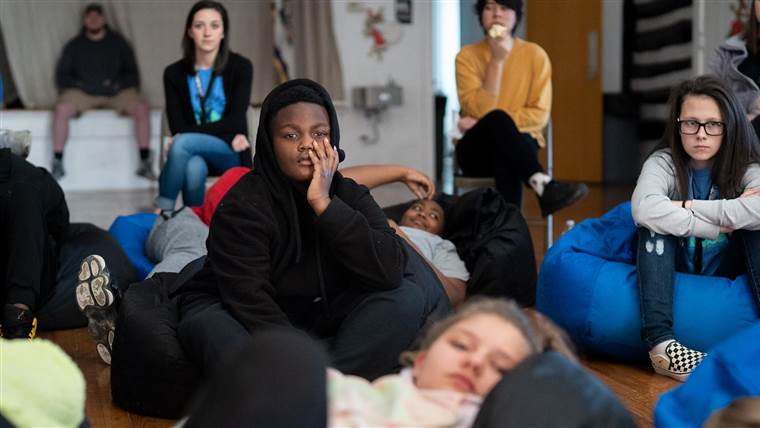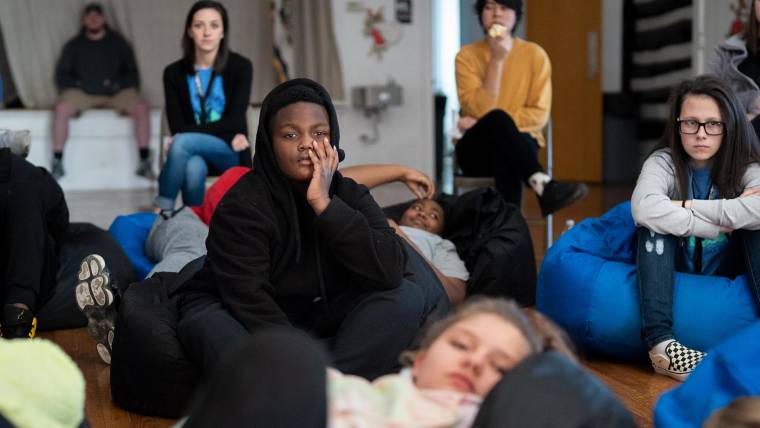Grim Christmas again for kids ‘cheated’ out of childhood by W. Virginia’s opioid crisis


PRINCETON, W.Va. — Santa won’t be able to bring the kids at Camp Mariposa the thing they want most this Christmas — their childhoods back.
These are the boys and girls whose parents were stolen from them, whose families were splintered, by the plague of opioid addiction that has been ravaging the United States for several years, and which has hit their home state of West Virginia especially hard.
They are, in the words of camp director Lea Morgan, the “cheated" children.
“They feel cheated,” Morgan told NBC News, one eye on her charges playing outside under an overcast sky. “They feel cheated that they didn’t get to be a child, that they didn’t have years of being carefree.”
And many are bitter, a fact that wasn’t immediately evident as 13-year-old Abbigal and her brother and their friend played on a swing set and laughed. But the bitterness surfaced quickly as she opened up about what she had seen and what she had endured.
To Abbigal, what happened to her and her brother boils down to this: Their parents had a choice: the kids or drugs. And they chose the drugs.
“I mean, sometimes it makes me sad,” she said, her voice more matter-of-fact than angry. “But it makes me mad to know that they won’t stop doing it for their kids.”
Which led to the inevitable question: If your parents could give you one present this Christmas, what would it be?
Abbigal didn’t hesitate with her answer. “Um, for my mom and dad to change their ways,” she said.
Camp Mariposa is full of kids like Abbigal whose parents haven’t changed their ways. It is part of a national mentoring and addiction prevention program that’s free for kids ages 9 and up. Across the country, there are 13 other camps like the one in Princeton, West Virginia, which NBC News visited earlier this month. And there are plans to open three more next year.
“Camp Mariposa is focused on kids who have a family member that has a substance abuse disorder,” said Mary FitzGerald, the CEO of Eluna, the Philadelphia-based nonprofit which helps run the programs.
More than 7,000 children in West Virginia (pop. 1.8 million) were in foster care as of November, according to state Department of Health and Human Services statistics. That is double the number from a decade ago, and more than 80 percent landed there as a result of the opioid epidemic, The Washington Post reported.
Nationally, nearly 1.2 million children landed in foster care because of parental drug abuse and those figures have risen steadily since 2012, according to the most recent research.
"We have kids who have lost parents to overdoses," Morgan said. "We have kids whose parents are incarcerated. We have kids whose parents have just walked away. And, we have some kids whose parents are in recovery, in rehab and things like that."
Camp Mariposa in Princeton, which opened in 2017, serves children ages 9 through 12. Some 80 percent of the 2,300 kids who have participated in camp programs across the U.S. reported at least one parent was hooked on drugs or had somebody in their family die as a result of drug abuse, according to statistics compiled by camp officials.
Sixty percent said they personally experienced some kind of abuse as a result of living in a household in which drug abuse ran rampant.
FitzGerald said there is “a huge need to focus on kids before they were teenagers, because kids living in a household with substance abuse are four times more likely to develop an addiction of their own.”
So campgoers take part in peer support sessions where they talk openly about living with family members struggling with addiction, about suicide, about the dangers of drugs and alcohol. They work with mentors to develop coping skills and share their harrowing stories of survival.
As Dayton, 12, played on the swing set with his sister Abbigal and Brianna, 12, he insisted he would never go down the road that his daddy took. His father, he said, has been in and out of jail so often, “he has been in the newspaper about 30 times.”
“Oh, no,” Dayton answered when asked if he would ever use drugs. “I use my mom and dad as an example not to do.”
While Dayton was all confidence, Brianna betrayed a deeper understanding of how watching her parents descend into drug addiction affected her. And she described her symptoms using the cadences and vocabulary of someone who is no stranger to therapy.
“I just figured out witnessing my mom have a drug overdose, it affected me in many ways,” she said. “Mainly my mental health. I have severe anxiety and major depression that I have to watch out for.”
Sleep, when it comes, brings little relief, she added.
“I can only sleep in the morning and nighttime is where I have to stay up and, like, try to knock out everything in my mind,” she said.
Elsewhere in the camp, Caroletta shed no tears as she described how, at age 13, she has become both a mother figure and a protector to her five younger siblings.
“I had to deal with my alcoholic stepdad and my mom was on drugs really bad and my real dad was on drugs really bad,” she said. “When my mom was on drugs, she would pass out and I would have to be the mom.”
When her stepfather was drunk, Caroletta said, “he would get very abusive with my mom and I would always make sure my siblings were in a safe place before I was in a safe place.”
Asked to describe the abuse, Caroletta answered, “Like, he would hit her, he would choke her.”
“I didn’t want my siblings to see that,” she said.
Caroletta said they watched helplessly as their parents blew the family’s food budget to feed their drug habits. “Some of the times, we would starve for weeks until somebody would help us out because they wouldn’t care,” she said.
When her parents could no longer take care of them, Caroletta said they were sent to live with her father. When he could not handle it, they were sent to live with their grandmother. And when their grandmother could not handle it, they found themselves living with a foster family in McDowell County, a destitute corner of West Virginia that never recovered from the collapse of the coal mining industry.
There they got “treated wrongly,” Caroletta, who was later adopted by another family, said. Her siblings live with other adoptive families now.
“I was always an adult to them,” she said of her siblings. “I grew up being an adult, not a child.”
When things became too chaotic, Caroletta said she coped by isolating herself from everyone and everything.
“Sometimes, I would want to go off by myself and not be in a world full of people,” she said. “I just want to just be me.”
But she could never escape the feeling that, deep down, her parents did not want her. Or the nagging suspicion that somehow she was responsible for her parents' addiction.
"It breaks my heart to think that any child would feel unloved or unwanted or that they caused such a grownup problem," Morgan said.
Caroletta said her time at Camp Mariposa has made her realize that none of what happened to the family was her fault — and that it was the real adults in her life who failed her.
“They destroyed our family and they hurt each and every one of us,” she said.
Asked if she could ever forgive her parents, Caroletta said no.
“I never will,” she said. “They ruined my childhood.”
But she clings to a vision of what her childhood could have been like.
“It wasn’t a perfect life, but my parents weren’t on drugs,” she said, the harshness gone from her voice. “I grew up as a happy kid, not having to take care of my siblings. I grew up having food every day.”
T.J., 10, and his 8-year-old sister Taylin, back home from the camp at their grandmother's house, remember watching their mother “put this clear stuff in her arm.” They remember what she called the spot on her arm where the needle went in.
“She said it was a spider bite,” T.J. said, his little hands clutching a video game controller.
Sometimes, an uncle would come by after she passed out and take them to a babysitter. Sometimes, they would just play in their rooms while their mom slept it off. And this happened just about every day, they said.
T.J. went to Camp Mariposa for the first time two years ago after his mother died. He remembers the last time he saw her alive.
“I just gave my momma a hug and said goodbye and went out the door,” T.J. said.
Taylin said her mom "wasn't herself that day.”
“She couldn’t stand up good," Taylin said. "She didn’t talk like she used to and she wasn’t happy at all.”
And then she was gone.
T.J. said he didn’t understand at first that his mother was dead when he saw her in a casket at the funeral. “I just started shaking her and saying, ‘Wake up!’” he said.
As T.J. spoke, framed photos of him and his sister with their mother sat nearby on a shelf. Both children said they ache for their mom, especially at Christmastime.
“A lot,” T.J. said, tears rolling down his face.
If you or someone you know is in crisis, call the National Suicide Prevention Lifeline at 800-273-8255, text HOME to 741741 or visit SpeakingOfSuicide.com/resources for additional resources.
Shako Liu reported from Princeton, Corky Siemaszko reported from New York.
 Pathways Drug Rehabilitation Luxury Addiction Treatment & Detox Center
Pathways Drug Rehabilitation Luxury Addiction Treatment & Detox Center


